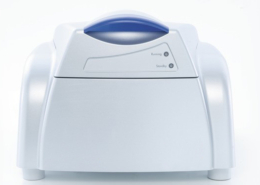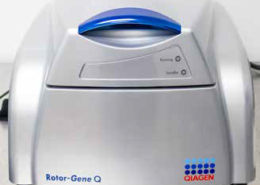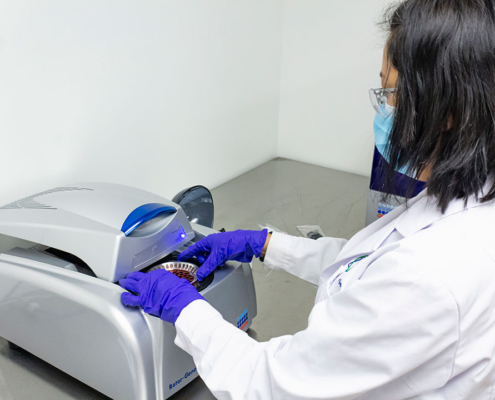A pivotal component for GMO detection and quantification via DNA, this instrument utilizes real-time polymerase chain reaction (qPCR) technology. This workhorse machine amplifies trace GMO fragments to detectable and measurable levels, enabling accurate analysis.
The Rotor-Gene Q is a real-time polymerase chain reaction (PCR) thermocycler manufactured by QIAGEN. It is primarily used for quantitative PCR (qPCR) and other applications requiring precise temperature control and fluorescence detection. As an analytical tool, the Rotor-Gene Q offers several key features and benefits:
Principle:
- Real-Time PCR:
- Real-time PCR, also known as quantitative PCR (qPCR), allows for the amplification and quantification of specific DNA targets in real-time during the PCR process.
- It relies on the detection of fluorescence emitted by fluorophore-labeled probes or DNA-binding dyes as the PCR reaction progresses.
Instrumentation:
- Thermal Cycler:
- The Rotor-Gene Q provides precise temperature control for PCR amplification, with customizable temperature profiles to accommodate various PCR protocols.
- Optical Detection System:
- The instrument is equipped with a highly sensitive optical detection system capable of detecting fluorescence signals in real-time during PCR amplification.
- Rotor Design:
- The Rotor-Gene Q features a centrifugal rotor design, allowing for efficient mixing of PCR reaction components and enhancing reaction uniformity.
Key Features:
- Multiplexing Capability:
- The Rotor-Gene Q supports multiplex PCR, allowing for the simultaneous amplification and detection of multiple target sequences in a single reaction.
- Wide Dynamic Range:
- It offers a wide dynamic range of detection, enabling accurate quantification of target DNA across a broad range of concentrations.
- High Throughput:
- The instrument supports high-throughput PCR with the capacity to process multiple samples in parallel, making it suitable for large-scale experiments.
- Software Integration:
- The Rotor-Gene Q is typically accompanied by user-friendly software for instrument control, data acquisition, and analysis, facilitating ease of operation and data interpretation.
Applications:
- Gene Expression Analysis:
- Quantification of gene expression levels in biological samples.
- Pathogen Detection:
- Detection and quantification of microbial pathogens in clinical, environmental, and food samples.
- Genetic Variation Analysis:
- Detection of genetic mutations, single nucleotide polymorphisms (SNPs), and allelic variants.
- Viral Load Determination:
- Quantification of viral nucleic acids for viral load monitoring in infectious diseases.
- Microbial Quantification:
- Enumeration and quantification of microbial populations in environmental and industrial samples.
Advantages:
- High Sensitivity:
- The Rotor-Gene Q offers high sensitivity, enabling the detection of low-abundance targets with precision.
- Quantitative Accuracy:
- It provides accurate quantification of target nucleic acids over a wide range of concentrations, making it suitable for both qualitative and quantitative analyses.
- Speed and Efficiency:
- Real-time PCR performed on the Rotor-Gene Q offers rapid and efficient results compared to traditional endpoint PCR methods.
- Automation and Workflow Integration:
- Integration with automated sample preparation systems streamlines workflow and reduces hands-on time, enhancing laboratory efficiency.
Challenges:
- Cost Considerations:
- The initial investment cost and ongoing maintenance expenses may be a consideration for laboratories with budget constraints.
- Optimization Requirements:
- PCR assay optimization may be required to achieve optimal performance for specific applications and targets.
- Data Analysis Complexity:
- Data analysis for real-time PCR experiments may require expertise in bioinformatics and statistical analysis, particularly for complex experimental designs.
Overall, the Rotor-Gene Q thermocycler is a versatile analytical tool that provides precise and reliable quantification of nucleic acids, making it indispensable in molecular biology research, clinical diagnostics, and various other fields requiring nucleic acid analysis.






![Cd-228-900x509[1]](https://nhplab.com/wpress/wp-content/uploads/Cd-228-900x5091-1.jpg)
